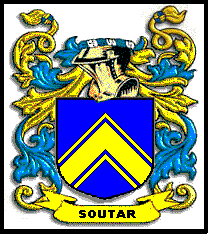The Soutar family (also spelt Souter and Suter) is one of the
oldest families from the Scotland and England border area.
The Soutar family has evolved through the ages with a number of
spellings, which have at one time or another been registered to the
family. The reason behind the variety in spellings is that during the
middle ages very few people, even persons of high status could pen their
own name. Hence, they told their name to the scribes and the scribes
would interpret the sound onto the various deeds and documents in their
own way. There is on record the following:
Suttar - 1633
Sowtare - 1464
Sutar - 1340
Southar - 1527
Suitor - 1645
Sutter - 1644
The Soutars settled in Dumfries, Scotland at an early date and while the
first official record is of Roger Sutor who held lands in that area in
1214, the family is believed to trace their heritage to the Ancient
Strathclyde Britons.
Strathclyde Britons were a race of Gaelic Celts whose territories
ranged from Langcashire in the south, northwards to the south bank of
the river Clyde in Scotland. The race was divided into several
sub-kingdoms, the Selgovians on the southern banks of the Clyde, the
Rovantii in Galloway in southwest Scotland, and the Rhiged to the south
in Cumberland, Westmoreland and Lancashire. From 400 A.D. to 900 A.D.,
they were overrun by the Irish Gaels, the Angles from the east, and the
Picts and Dalriabans from the north. However, their basic culture was
relatively undisturbed. In 900 A.D. the coastal regions were invaded by
the Rose Vikings, and through intermarriage these intruders left much of
their blood running through the veins on their descendents. By 1000 A.D.
however, the race had formed into discernable Clans and families, and
many of our modern family names can be traced from this period. English
Scottish boarder history commences about this time and many books have
been written of these families who gathered together into territories of
their own, ruled by an elected Chief, almost as a King. A family which
grew outside of the Clan system had little chance of survival, hence the
term 'of that Ilk' or 'of that name' grew, particularly where the Clan
also named themselves after the territory, or vice versa.
As a deeply rooted family of great acceptance, the Soutar family
found themselves much involved in the affairs of the day. They
contributed too much to the foundation of both countries and their
people, through their part in history. There was a poem written in the
annals by Lindsey about the Soutars.
"Of that surname I neid nocht be aschamit
For I can mak schone, butekins, and buittis,
Gif me the coppie of the king's cuttis
And ye sall se, richt sune, quhat I can do."
They were a family of some stature and respect and played their part in
history through their witnessing of deeds and documents, which were to
prove invaluable to historians and tacticians. Henry Dictus Sutor held
land in Perth in 1375, and Thomas Suteur, a Scots ship owner, held a
document of safe conduct into England for the benefit of trade between
the two warring countries in 1438. Thomas Soutar obtained from the abbot
of Cupar the lease of a portion of the land of Muirton in 1457. Duncan
Seutter was tenant in Auclyne under the bishop of Aberdeen, 1511, and
John Soutare of Mont had a feu of part of the lands of Wester Banchreis
in 1586. In 1460 some members of the house of Johnstone in Annandale
assumed the name of Souter in consequence of 'some discontent' and
settled in Perthshire, in August of 1633, by Act of Parliament they were
allowed to resume their ancient surname.
In 1603, the union of the Scottish and English crowns was effected
when King James VI of Scotland also became King James 1st of England. At
this time it was expedient to take definite steps to disperse the
'unruly border clans'. In 1587, an Act of Scottish Parliament had
condemned certain border families for their lawlessness as Scotland
moved towards breaking up the old 'border code' which had been
established many centuries before. Notable amongst the 'unruly' Clans
were the Kerrs, the Douglasses, Scotts, Johnstons, Maxwells and Moffats,
to name but a few. These names had been associated with the very same
'border law' which each successive King of Scotland had subscribed to
and agreed. For the next fifty years they moved sometimes forcibly to
England, to the northern Scotland, Ireland, and of course, to the
'Colonies'. The New World had many attractions. They could pursue a
democratic way of life, receive grants of land and not be concerned
about the loss of their lands. They sailed aboard the armada of tall
sailing ships, which plied the North Atlantic for the next two
centuries.
